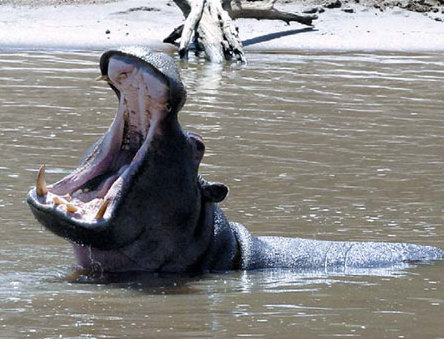Fears surface after hippo kills tourist from Shanghai
Updated: 2013-04-24 07:59
By Li Lianxing in Nairobi, Kenya and Shi Yingying in Shanghai (China Daily)
|
||||||||
|
A hippopotamus in the Mara River in Kenya. Tourists are advised to stand at least 20 to 50 meters away from hippos while observing them. Xu Su / Xinhua |
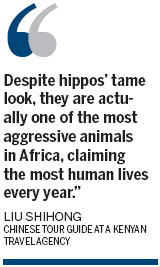
Visitor to Kenya attacked while attempting to photograph calves
A Shanghai tourist killed in Kenya by a hippopotamus on Monday has sparked fears among tourism insiders over Chinese visitors joining adventure tours without sufficient awareness of self-protection.
The Standard, an English-language newspaper in Kenya, reported that a woman in her 30s was attacked by a female hippo as she tried to take photos of a baby hippo at Lake Naivasha Country Club, 5 km from a nature reserve in the town of Naivasha. She died on the way to hospital.
Kenyan Wildlife Service officers shot the hippo dead after the incident.
The woman, who has not been identified, was seriously injured to the waist and neck and was taken to a private hospital where she was pronounced dead, Osman Ibrahim, the warden in charge of Hell's Gate National Park, south of Lake Naivasha, told the newspaper. Her body was taken to Nairobi, the Kenyan capital.
The Chinese embassy in Kenya confirmed the incident, according to Xinhua News Agency, but had released no further details as of Tuesday night.
Zhang Jie, from the Shanghai Tourism Administration, said it was an isolated case and the tourism bureau is not advising Chinese tourists to stop visiting Kenya.
Han Jun, chairman of the China General Chamber of Commerce in East Africa, who also runs a travel agency in Nairobi also said the accident was an individual case.
He said more than 40,000 Chinese travelers visited Kenya last year. The figure was just 28,000 in 2010, according to the China Tourism Academy.
Tang Yao, tourism manager at Zijing Great Wall (Kenya) Travel, said the accident has not had an impact on his business so far.
"We are receiving loads of enquiries regarding prices every day and no one has voiced their concern about the accident yet," he said.
Lake Naivasha is one of the major habitats for hippos in Kenya.
"Hippos normally remain underneath the water in daytime and come to the bank for food at night," said Liu Shihong, a Chinese guide working at a Kenyan travel agency.
"Despite hippos' tame look, they are actually one of the most aggressive animals in Africa, claiming the most human lives every year."
Liu said he usually warns his guests not to approach the banks of Lake Naivasha after dinnertime.
Shi Qiong, a Shanghai native who visited Kenya and Tanzania in September, said many Chinese are attracted by African safaris, but many of them are not prepared for such adventures as "they are used to traveling with tourist groups that do the homework for them".
"They don't have enough self-protection awareness - hippos in a wild environment are different from those they see in the zoo - they're more aggressive," said Shi.
She added that her African tour guide advised her to stand at least 20 to 50 meters away from hippos while observing them.
Meanwhile, Han said her hotel in Kenya failed to give proper warnings to Chinese tourists.
"With the increasing number of Chinese tourists, many warning signs are still in English, French or other languages, not Chinese," he said.
Jiang Yiyi, a researcher with the China Tourism Academy's International Tourism Development Institute, said nowadays tourist safety concerns not only come from animal attacks but also from road safety issues, political turmoil and robbery. She advised tourists to buy insurance before heading abroad.
"Carry travelers' checks or use credit cards instead of cash if possible," Jiang said. She also called for Chinese tourists to regularly check official websites of the National Tourism Administration and Ministry of Foreign Affairs before visiting a foreign country to avoid dangerous areas.
Han added: "In the past, there were cases of traffic accidents or violation of regulations in the wild in Kenya that claimed the lives of Chinese tourists. Almost all the accidents were associated with illegal travel agencies or unprofessional tour guides."
Han said many Chinese tourist agencies organized their teams in China and then transferred them to less-qualified local companies to run tours. He said legally registered and professional tour agencies in Kenya will provide training on security protection for tourists.
Contact the writers at lilianxing@chinadaily.com.cn and shiyingying@chinadaily.com.cn
(China Daily 04/24/2013 page7)

 Children gathered together as healing process begins
Children gathered together as healing process begins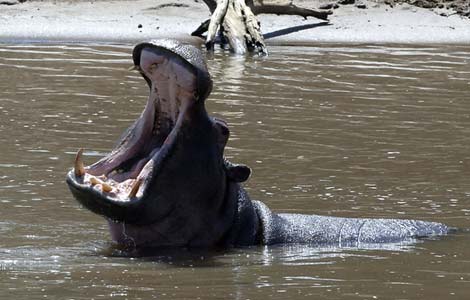
 Fears surface after hippo kills tourist from Shanghai
Fears surface after hippo kills tourist from Shanghai
 Rescuers win people’s hearts
Rescuers win people’s hearts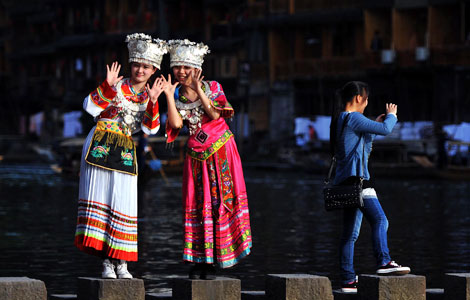
 Law to curb tourism price hikes
Law to curb tourism price hikes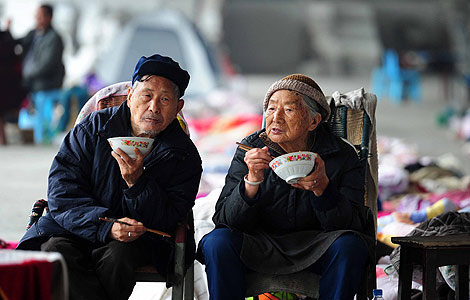
 House damaged, life continues in Sichuan
House damaged, life continues in Sichuan
 Relief reaches isolated village
Relief reaches isolated village
 Rainfall poses new threats to quake-hit region
Rainfall poses new threats to quake-hit region
 Funerals begin for Boston bombing victims
Funerals begin for Boston bombing victims
Most Viewed
Editor's Picks

|

|

|

|

|

|
Today's Top News
Industry faces recovery fight
China's 2nd aircraft carrier will be 'larger'
China thanks countries
for quake relief aid
China, US to enhance mutual trust
Beijing protests Diaoyu incident
Copyrights take a bite out of Apple
Four new H7N9 cases
Landslide kills 9 in SW China
US Weekly

|

|
